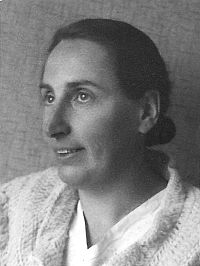Selma Meyer facts for kids
Quick facts for kids
Selma Meyer
|
|
|---|---|
 |
|
| Born |
Sara Cato Meyer
6 July 1890 Amsterdam, Netherlands
|
| Died | 11 February 1941 |
| Occupation |
|
Sara Cato (Selma) Meyer was a brave Dutch woman born in Amsterdam on July 6, 1890. She believed in peace and equal rights for women. Selma was also a resistance fighter during World War II, working against the Nazi occupation. She passed away in Berlin on February 11, 1941, at the age of 50.
Contents
Selma Meyer's Early Life and Work
Selma grew up in a Jewish family in Amsterdam. Her mother, Sophie Meyer-Philips, was related to the people who started the famous Philips company.
When she was 18, Selma started working as a typist. In 1923, she and Annette Monasch took over a company called the Holland Typing Office (HTO). This company offered typing services and was one of the first places in the Netherlands to help people find jobs, especially typists. They also sold typewriters.
Fighting for Peace and Rights
Selma Meyer was very involved in helping others and working for a better world.
Joining the Peace Movement
In 1923, Selma joined the Pacifist Women's League. This group was the Dutch part of a bigger international organization called the Women's International League for Peace and Freedom. Selma became the secretary of the Dutch section, working to promote peace.
Helping Those in Need
During the 1930s, Selma helped many people. She was part of groups that assisted young German refugees who had fled their country. She also helped victims of the Spanish Civil War. Selma even supported the resistance movement in Germany, which was fighting against the Nazi government.
Political Involvement and Resistance
From 1930 to 1936, Selma was a member of the SDAP, a political party. She helped start the National Peace Centre in 1936. In 1937, she went to a conference in Paris to help Republican Spain during its civil war.
Selma became good friends with Hans Ebeling, a German resistance fighter. Her company, the Holland Typing Office, was very important. It only hired women and helped publish a secret magazine called Kameradschaft. Selma supported Ebeling and other resistance fighters by giving them a safe place and money for their publications.
By late 1939, the German military intelligence service, the Abwehr, had Selma on a special list. This meant they planned to find and question her after they invaded the Netherlands.
Selma's Arrest and Death
In April 1940, Selma became ill. When German troops invaded the Netherlands on May 10, 1940, she was recovering in Zeeland. She tried to escape to France. However, she worried about her mother and her employees, so she returned to Amsterdam. There, she joined the Dutch resistance movement.
On October 26, 1940, Selma was arrested. After being questioned in Amsterdam and The Hague, she was taken to Berlin in mid-November. There, the Gestapo, the Nazi secret police, questioned her in prison. In January 1941, Selma became very sick with an infection called peritonitis. She was taken to a Jewish hospital in Berlin. She died there on February 11, 1941, after surgery. Selma Meyer was buried in an unmarked grave at the Jewish cemetery in Weißensee.
See also
 In Spanish: Selma Meyer para niños
In Spanish: Selma Meyer para niños

